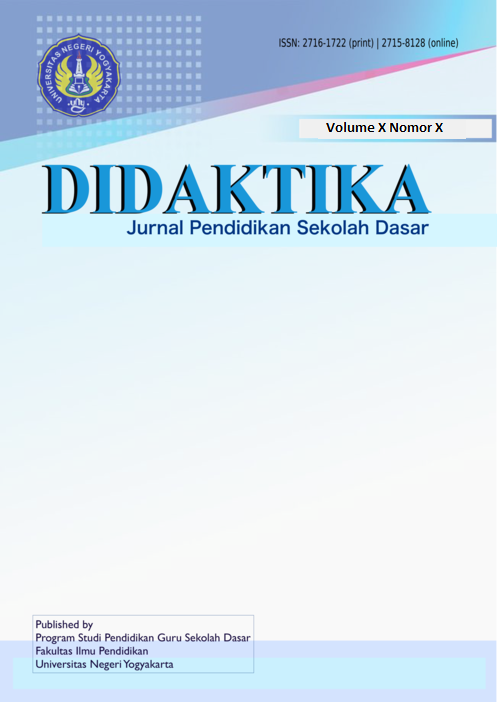Peningkatan Keterampilan Sosial Siswa Melalui Metode Bermain Peran Siswa Kelas V Sekolah Dasar Ringkas dan Informatif
DOI:
https://doi.org/10.21831/didaktika.v1i2.28090Abstract
This study aims to improve the social skills of V.C class students through role playing methods. This research is a classroom action research with research subjects of V.C class of SD Muhammadiyah Karangkajen, Yogyakarta. This study focuses on improving students' social skills. Data collection techniques are obtained through observation, interviews and measurements through social skills scale. The analysis technique used is by comparing the results of social skills before and after the action. The results of this study are an increase in the scores of students' social skills. From pre-cycle activities to cyclum II experienced an increase in the number of students in the high category. Prasiklus shows 68% of students fall into the high category, then increase to 92% in cycle I and cycle II. Based on the results of cycles I and II show that the role playing method as one of the learning methods to improve students' social skills.
References
Campbel, L., Campbell, B., & Dickinson, D. (2006). Metode praktis pembelajaran berbasis multi intelegensi. Depok: Intuisi Press.
Golemen, D. (2003). Kecerdasan emosi untuk mencapai puncak prestasi. Jakarta: Penerbit Gramedia Pustaka Utama.
Mindes, G. (2006). Teaching young children social studes. London: Praeger.
Schunk, D. H. (2012). Learning theories : an educational perspective. USA: Pearson
Downloads
Published
How to Cite
Issue
Section
Citation Check
License
- Authors retain copyright and grant the journal right of first publication with the work simultaneously licensed under a Creative Commons Attribution License that allows others to share the work with an acknowledgement of the work's authorship and initial publication in this journal.
- Authors are able to enter into separate, additional contractual arrangements for the non-exclusive distribution of the journal's published version of the work (e.g., post it to an institutional repository or publish it in a book), with an acknowledgement of its initial publication in this journal.
- Authors are permitted and encouraged to post their work online (e.g., in institutional repositories or on their website) prior to and during the submission process, as it can lead to productive exchanges, as well as earlier and greater citation of published work.






